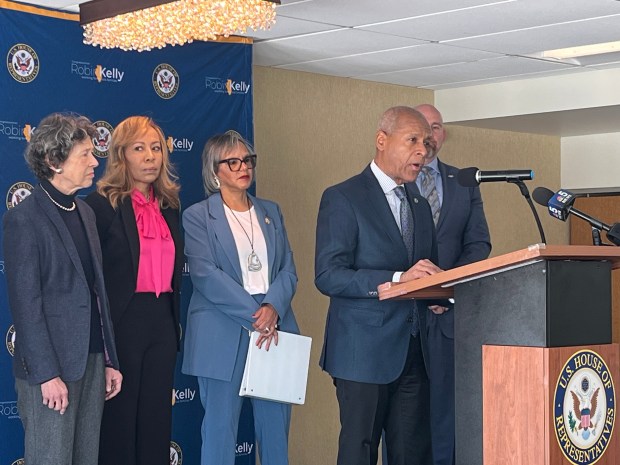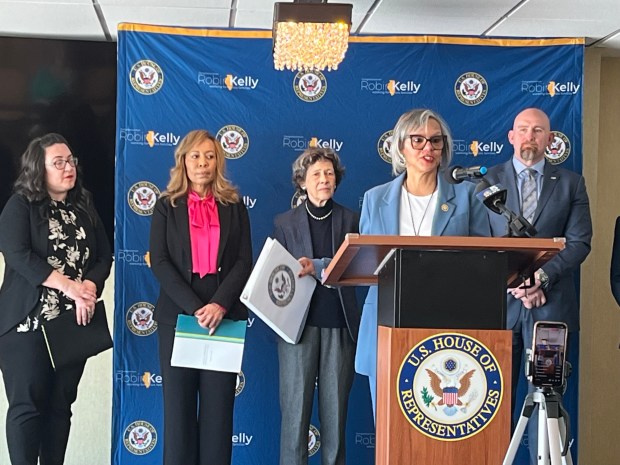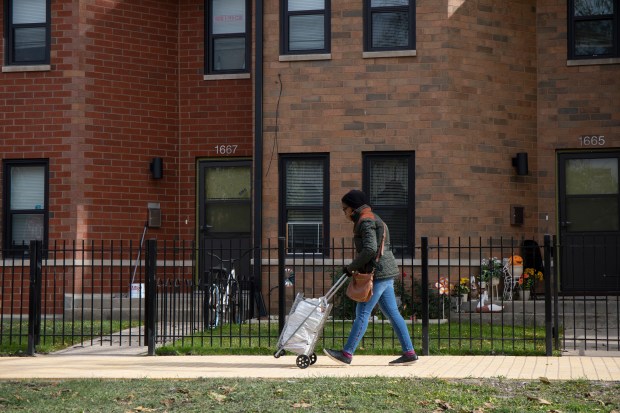Becky Gremley, of Mokena, said when her 17-year-old autistic son, Oliver, heard Donald Trump was elected to a second term as president, he asked, “What’s going to happen to me and my future?”
Gremley said Thursday she worries often how Trump’s pause in federal funding and the elimination of diversity, equity and inclusion programs could affect Oliver, a student at Lincoln-Way High School.
Trump also made promises on the campaign trail to eliminate the U.S. Department of Education, which Gremley said provides resources and accommodations that have helped Oliver thrive.
“If President Trump succeeds in dismantling the board of education, canceling Medicaid and/or DEI, that will jeopardize my son’s future education and make it harder for him to be a successful, independent adult,” Gremley said at the news conference with U.S. Rep. Robin Kelly in Hazel Crest.
Kelly was joined by Hazel Crest Mayor Vernard Alsberry Jr., leaders of Chicago area organizations that benefit from federal aid and others who explained their concerns about Trump’s pause in federal funding, which the president said is to ensure spending is in line with his agenda as well as a House Republican proposal to cut billions of dollars in spending for Medicaid.
John Peller, the president and CEO of AIDS Foundation Chicago, was firm in his opposition to Trump’s executive order ending equity-related grants and contracts from the federal government.
The AIDS Foundation Chicago, along with two other nonprofits, filed a lawsuit Wednesday against the executive order and two others related to DEI. The AIDS Foundation Chicago receives close to $35 million annually from the federal government, the loss of which would force the foundation to cease operations, according to the lawsuit.
“Thousands of AFC’s clients achieve greater stability thanks to a constellation of federal programs that provide critical support,” Peller said.
Those programs include Medicaid for health care, mental health and substance use services, the Housing Opportunities for People with AIDS Program, which the AFC uses to support 1,300 people living with HIV, and the Ryan White Program that supports case management and access to HIV medications, he said.
While many speakers focused on future affects of Trump administration agenda items, Debra Shore said she was dismissed from the Environmental Protection Agency’s Chicago office Friday as part of a set of mass firings aimed at shrinking the federal workforce.
Shore said these efforts, which have largely been spearheaded by Elon Musk’s Department of Government Efficiency, will usher in “a patronage system where what matters is not what you know, but who you know.”
“We in the Chicago region certainly know the patronage can be corrosive and corrupt,” Shore said.
Alsberry told the Daily Southtown after the news conference that south suburban leaders are working together to determine how to manage the fear and confusion developing in response to the flurry of federal action.
“It’s hard for people to keep up, and they’re really, really afraid,” Alsberry said.

When it comes to ensuring Hazel Crest and other municipalities continue receiving federal assistance, Alsberry said he is following the lead of state and county officials. He said as mayor he is looking to amplify the importance of townships as a “social net” in the Southland so residents can continue to receive the government support they need.
“We’re talking about food banks, we’re talking about services for the indigent — the townships are the ones who take care of all that,” Alsberry said. “So we’re going to have to be sure that our townships are ready to take on that burden and understand what’s coming.”
ostevens@chicagotribune.com




